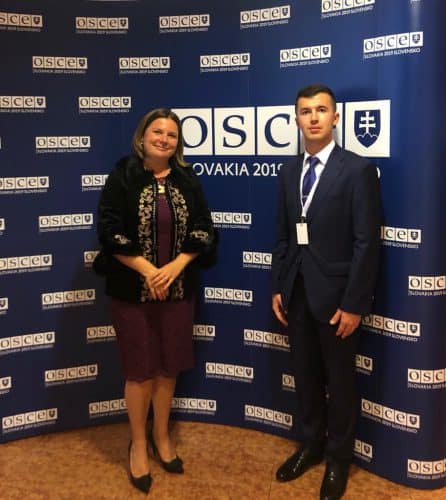By Dmitry Erokhin, Research Assistant in the IIASA Advanced Systems Analysis Program
Dmitry Erokhin shares his thoughts on the promotion of economic progress and security through energy cooperation, good governance, and connectivity in the digital era.

Nadejda Komendantova and Dmitry Erokhin at the OSCE EEF meeting in Bratislava © Dmitry Erokhin
From 27 to 28 May 2019, Bratislava hosted the Second Preparatory Meeting of the 27th Economic and Environmental Forum of the Organization for Security and Cooperation in Europe (OSCE EEF) on “Promoting economic progress and security in the OSCE area through energy cooperation, new technologies, good governance and connectivity in the digital era”.
As part of my work on digitalization in Greater Eurasia, I was particularly interested in attending this meeting.
A major part of the event was devoted to questions surrounding energy security, which is a very important factor of cooperation in the OSCE area. All 57 participating states across North America, Europe, and Asia are interested in stable energy supply. Doing energy right is a way to promote progress, security, and prosperity. Orientation towards sustainable development, limiting the use of conventional energy sources, oil conflicts, and cyber attacks make both energy demanders and suppliers search for new solutions. In this regard, the use of renewable resources promises long-term benefits in terms of energy efficiency, new jobs, as well as a secure and resilient energy sector. This is however not possible without peace, which makes the protection of infrastructure crucial. There is no prosperity without peace and no peace without prosperity.
I found it particularly valuable that new technologies were included in the discussion. Blockchain – a system in which a record of transactions made in bitcoin or another cryptocurrency are held across several computers that are linked in a peer-to-peer network – along with big data, are creating new opportunities in the energy sector, for example, in terms of new forms of energy trading. However, they can also pose some risks as they create certain dependencies, thus raising questions of sustainability. For instance, automated driving raises many regulatory issues on how to ensure against cyber attacks and missiles, or how to divide responsibilities between producers and users. Advanced technologies have to be employed safely and efficiently. International organizations could play a vital role in enacting common standards and regulatory norms for digitalization and connectivity in this regard. One grand example here is the single window recommendation, which is a trade facilitation idea that enables international traders to submit regulatory documents at a single location. The idea is that such a system would facilitate trade through good governance.
The establishment of regional communication platforms and the development of science, research, and innovations are of particular importance. Key agents need to talk about secure and clean energy. This could be achieved through intra-institutional cooperation and inclusive dialogue. I believe that institutions like IIASA can play a huge role here.
Talking about new technologies, it is an important task to conduct studies on barriers to trade, especially in the context of blockchain and machine learning technologies in digital trade in order to detect inefficiencies at borders and improve market access. In the energy field, there are many controversial estimates (simultaneously in favor of conventional and renewable energy sources), which also make independent reputable studies essential.
Nadejda Komendantova, a researcher with the Advanced Systems Analysis Program at IIASA also represented the institute at the OSCE meeting, where she moderated a session on protecting energy networks from natural and man-made disasters. The sessions’ participants discussed the impact of these factors on energy security, analyzed opportunities and threats for secure energy networks connected with new technologies, raised questions of resilience, and talked about the mitigation of threats through effective policies and cooperation. The OSCE Critical Energy Infrastructure Protection (CEIP) Digital Training Platform was presented during the session.
To conclude, I would like to emphasize that we need more such constructive and fruitful discussions to catalyze trust, growth, security and connectivity. Partnerships create political will and make open dialogue and mutual support very important. I believe that organizations like IIASA are key to making this possible.
Note: This article gives the views of the author, and not the position of the Nexus blog, nor of the International Institute for Applied Systems Analysis.

You must be logged in to post a comment.